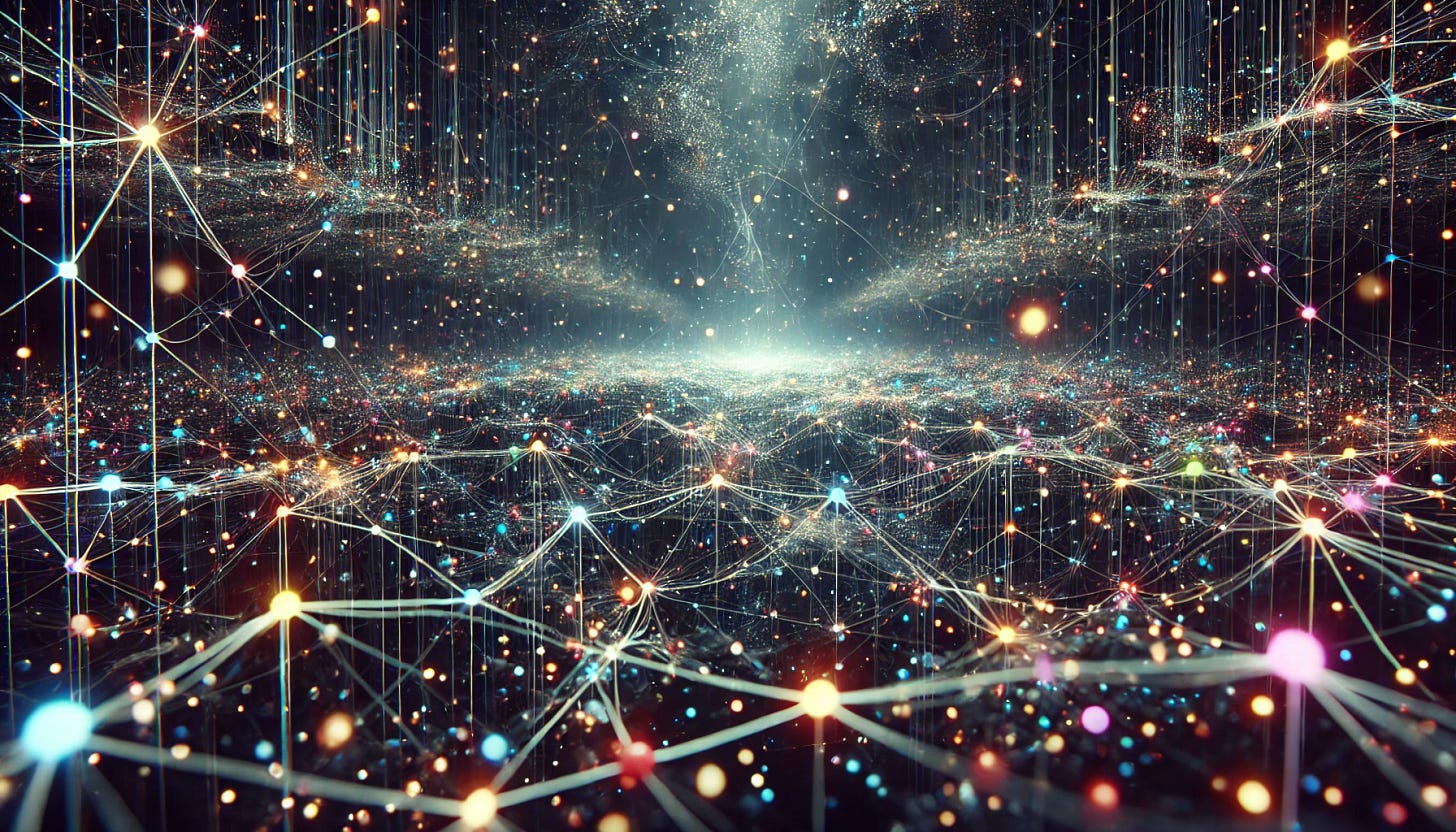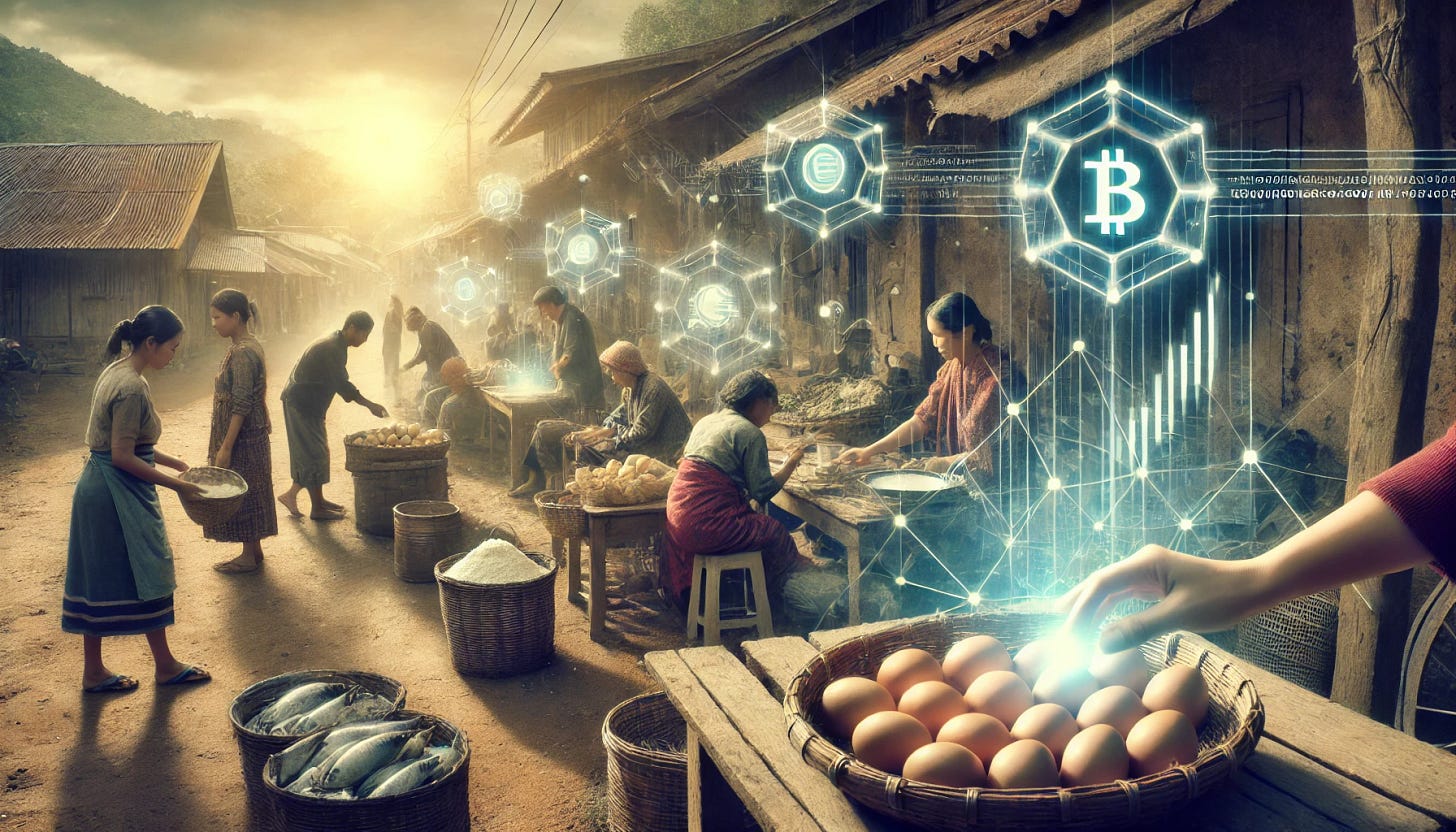Picture It
Guest Post by samizdope
Greetings, Ascetics!
Today, in a special edition of Digital Heresy, we edge into the uneasy intersections of AI, society, and the future of work through a series of evocative vignettes. Today’s piece, penned by a friend and guest author, samizdope, offers a sobering look at how artificial intelligence might reshape humanity’s path — not always comfortably - but undeniably with impact. So settle in, and prepare for a thought-provoking read.
(1)
“Picture a scientist, rockin’ their lab coat, hunched over a table where they got a microscope and a petri dish,” Keke says. Keke was always talking. Sometimes you wanted to listen. Sometimes you didn’t. Jake couldn’t tell which now. Talking to her is the American West, the open road, a roadside rest area with nothing around for miles, and sometimes you cared whether it was filthy and sometimes you just needed a piss.
She goes on, “this scientist is growing a mold. Could be the super-cure, could be the next great lung sickness, they don’t know. Under the microscope it goes. They look, look, look. Then with no fanfare, no visible disappointment, they scrape everything out into a hazmat bin and set the now-empty dish into a tray to be sanitized.”
“Not a good mold?” Jake asks.
“It was pretty damn good, actually. But not insanely great. Not transformative.”
“Is this a good allegory though?”
Keke laughs. “Yeah, because it has a twist ending. Tell me, what’s what in the metaphor?”
Jake thinks. “The mold is… progress. Some kind of technology. Something difficult. The petri dish is like a… a blank page. The future that might be written if only they could grow the most amazing mold.”
“And the scientist?”
“The scientist is us. Rational folks, making sense of the universe and building shit out of it.”
“Wrong!” Keke yells, slapping her hand on her thigh in triumph, spilling a little bit of her coffee. “Humans have been telling each other for two hundred years that we’re the scientist. And it was true once. But not now. C’mon, I see you tuning out already. You mustn’t avert your eyes. Look around at the chaos in the economy, in politics, in the environment. Look at the new thinking machines, in their adolescence now. That’s the mold, and the scientist is damn good at getting it to grow in new and powerful ways.
“Humankind isn’t the scientist. We’re the fucking growth medium!”
(2)
Picture this: you’re in a vast room, its boundaries falling away out of sight in every direction, nothing in it, except everywhere in the air are little dots, just large enough to be seen. Uncountable, and somehow every one is connected to many of its neighbors, a gossamer construction of incredible complexity.
Now imagine this isn’t just a room in three dimensions. With an imperceptible tilt of the head, you shift the scene. Some of the dots stay in place, but millions of others are gone, replaced by new ones with new connections. What you didn’t do is take a new perspective on the same three dimensions you saw before. No, you’re looking at a different three out of the unfathomable number of dimensions in this room.
This is high cardinality space, and it’s one way to think about how today’s neural networks work. There’s nothing physical, of course, just a vast and vastly complex mathematical volume, data spreading out like the sand of the Arabian Desert.
Type a prompt into ChatGPT or Claude and it gets turned into numbers that flow like a strong wind into one side of that desert. This wind jostles numerical sand grains into their neighbors, the subtle connections between them determining how the shockwave propagates throughout the desert, sometimes in shocking ways.
The propagation continues until you’re left with an output of words that seem exactly like magic, even when they’re not exactly the right words.
(This is not quite how the image generators work, but let’s save that for another time.)
Back to the first metaphor: the relationships between those numerical dots floating in our high cardinality room were fixed there by performing very advanced math on the sum of all human knowledge: the Internet (at least the English part.) It’s this mathematical structure trained into a large language model that allows it to predict which word in the sequence that started with your prompt is the best next word to emit.
And there’s not much more to it. Sounds straightforward, except the results will still make your jaw drop even when you know what the magician is up to.
Fine, amazing, I love it, but then comes the realization: generative AI is a nuke placed at a pressure point along a taut fault line that runs through not just one populated area, but every populated area that exists or ever will.
(3)
Picture Paul Muad’Dib, sitting meditatively atop a dune. For all his prescience, he can’t see what will happen beyond a certain point, the “boiling nexus” where some confluence of the whims of powerful people and the tectonic forces of history conspire to produce a node in time where events could go any direction. He tells us this is just like sitting atop a dune, in fact. You see the next dune, and everything in the trough between you and it, but beyond? A guess, a mystery, until you’ve walked there, and once you have, that’s where you are and there’s no putting that sand back in the toothpaste tube.
He tries to avoid starting the jihad, but it happens anyway. Does agency exist?
Maybe the universe was better off after his holy war. I dunno. Like a lot of people, I disliked the second book so much that I never read past it.
But surely a lot of people suffered and died to lay the bloody groundwork for whatever came next.
(4)
Sanjay took a ginger sip of his whiskey. He’d been nursing it all evening. Nice but not cheap. A splurge, and it seemed like he didn’t have many more splurges coming in the near term.
“I’ve never seen a tech job market as bad as this,” he said, staring into the amber depths of the liquid. “And I survived the financial crisis and the dot-com bust.”
“I don’t know,” counters Kim. “I mean, yeah, on LinkedIn you see nothing but horror stories about qualified candidates applying to hundreds of jobs, getting interviews, getting ghosted, and this goes on for months and months.”
Sanjay smirks. “This is how you disagree with me?”
“But that’s just the Almighty Algorithm,” she continues. “Sob stories get engagement, get more impressions, get you to engage, and then it’s off to the races. You get flooded with whatever you click Like or Support on. It’s no wonder that you think it’s pervasive, because the Almighty doesn’t show you anything else.”
“You and I are two of those sob stories.”
“Yeah, well…” She trailed off. “Still, maybe it’s not as bad as you think, is all I’m saying.”
“You’re an accomplished engineer and I’m a pretty awesome product manager. We both have years-long track records of shipping successful software. And we’re still getting screwed. But worse, there’s no clear reason for it. Yeah the economy is still sluggish post-pandemic, but that alone can’t account for the massive number of mass layoffs, or the demeaning job market where you have to abase yourself over and over and still not get anywhere.”
Kim sat quietly for a while and finished her beer—one of the cheap ones. “Remember when we used to feel sorry for the copywriters and junior marketers and illustrators who were going to be hit hard by gen AI?”
He nodded and sipped again.
She found that she had already come around to his way of thinking. “The LLMs have gotten so good at code — the easy stuff, for now - but still, you don’t need nearly as many junior engineers to get something built as you did two years ago. Fewer junior engineers, fewer senior engineers, fewer project managers.”
“Fewer product managers.”
“And fewer middle managers. Since you pulled it out of me, I’ll admit that when I let myself worry, I worry that this isn’t a tight labor market. It’s a step-function change in the economy.”
(5)
Picture Jo. She raises hens. The hens lay eggs. The roosters become stew, mainly.
Jo likes bread, but she can’t mill flour. So she trades eggs to Bob Miller. (Guess what he does.) They agree on a ratio of eggs to flour that seems equitable.
Bob bought the eggs because he and his family like eggs. But Bob also trades flour for tasty baked goods from Sam Baker in the next town over. Sam makes great pastries. The pastries use up a lot of eggs. An idea occurs to Bob. He offers Jo a deal to take more of his flour, but at an egg-to-flour ratio that’s better for her overall. She accepts, because she likes to bake and needs something to do with her excess eggs. Next time Bob sees Sam, Bob has a load of eggs in the cart next to the flour. Sam loves the convenience of getting his eggs from the same place as his flour—it’ll save so much time—but there’s a problem. Bob can’t eat more pastries.
An idea occurs to Sam. He has friends another town away, the Fishers. And Bob once let on that he has quite a taste for fish. Sam, not so much. So Sam says let me take the eggs now and next time you come I’ll have fish for you. Bob says just take it on faith that you’ll repay me for the eggs? and Sam says come on, give me some credit. Bob agrees.
So now the dozen eggs traded for five pounds of flour has become ten eggs that equal four large fish. Exchange rates. Middlemen. Value-adds. Fast forward a few decades and money has to be invented because the web of trade is too complex and has too many ratios, like how many eggs equals a fish vs. how many eggs equals a fish when you get them from the same guy who brings your flour.
To say nothing of furniture. Or healing salves.
So an abstraction must enter the picture, and now we exchange eggs and flour and fish and pastries and salves for mathematical quantities that don’t exist. Such capital is an emergent property of the web of trade.
Just like the words that emerge from ChatGPT.
None of these names are the names of the inventors of capitalism, of course. It was eons ago. I’m sure a historian would laugh and tell me how inaccurate my portrayal is, but we know it’s the truth, really.
They say we’re in “late stage capitalism.” Production and consumption trumping the health of the planet that we claim to respect, and depend on in any case. Record levels of inequality. Dirt poor families, threatened with extinction if they get in a rough spot health-wise and need care or medicine. Bezos, with his huge yacht that follows his huger megayacht, the merely huge yacht just for staff like his backup chef and his racing hydrofoil catamaran maintenance techs. Upper middle-class couples who don’t live large but still aren’t secure in this economy. (All it takes is a rough patch and they’re living paycheck to paycheck too.) Multibillionaires who do nothing more than move mathematical abstractions around inside a high-cardinality space, watching their slice of the pie grow, all the while claiming that a growing pie grows all slices. Cape Town slum dwellers.
Into this taut fault line we now place the nuclear bomb of machine learning.
What would Bob Miller and Sam Baker and Jo Henraiser and the Fishers do if synthetic eggs and flour and fish became so good and so cheap that no one wanted their goods? Sam can still make a living because he’s taking raw foodstuffs and using skill to make tasty things, serving them with a smile. Then again, how long can he do that if Jo and Bob and the Fishers don’t have anything to trade in return for his pastries?
What happens when that entire web of commerce collapses because of some radical, cross-cutting innovation?
The tech sector might be about to find out. Generative AI is absolutely turbocharging workflows for marketers, salespeople, programmers, product managers, and many others. Turbocharging sounds good. Turbocharging is good. Increasing productivity is good, as long as it’s not the product of breaking backs.
But unless business grows to match the pace of the productivity grains, turbocharging means fewer people get hired. I believe that’s a big part of what we’re seeing in the tech labor market. (That, and some folks’ foundational rudeness. Ghosting? Really? Send a fucking email.) Granted, no knowledge worker has a life nearly so precarious as a laborer’s, but it is still tough and scary.
Machines are making the synthetic eggs and flour and fish pretty well these days, not flawless, but amazing, and they’re only getting better. The knowledge-working progeny of Jo and Bob and the Fishers are feeling the squeeze.
Maybe there’s another way this could go. Muad’Dib sees the bomb go off, its earthquake destroying the web of commerce, but he also sees a different possibility arising in that boiling nexus of uncertain futures.
I’ve always found it impossible to imagine any economic system besides capitalism. Anything that works at scale and for long, I mean. (Although The Dispossessed makes a pretty good go at it.) It just seems natural that Jo would agree that this much of Bob’s flour is worth such-and-such number of eggs, and that eventually if she had a hankering for fish, she could work out how many eggs it would take to buy one off Bob, who is getting a little chubby, if she’s honest.
But in a world where wondrous words and pictures and videos can be created wondrously fast, and the knowledge work sector crumbles, and there are only so many service industry jobs to go around, since there are fewer people who can afford to get served, either former techies starve and Bezos has vastly fewer customers to fund his auxiliary yacht and the dragon begins to eat its tail in earnest, or we as a society—as a kind—as humankind—find another way.
What if as a result of this convulsion we find out that by paying people wages that respect their humanity, by leveling out the dune crests and troughs a little (to mix the metaphor), the web of commerce can continue? And what if it can also give people back more of their most precious commodity—time—to enjoy a life beyond toil?
What if, in the post-ML world, Universal Basic Income and an improved economic safety net not only lie within reach, but are an absolute necessity?
Such an outcome would require a sea change in our politics, but put enough Tesla drivers on the dole and we’ll see how quickly seas can change.
I work in ML. I am an LLM advocate. I want to help people turbocharge their work. I don’t want anyone out of business or in poverty as a result. I could stop myself from running across to that other dune where the boiling nexus waits, but that wouldn’t make one iota of difference, since plenty of others won’t stop, and besides, we don’t actually know if something awful awaits us there.
Instead, I hope we can collectively avoid the jihad and turn the economic disruption from AI into a society that is less based on the ratio of the value of eggs to fish to software to essays to a college education, and more based on a return to why we got productive in the first place: living.
(Epilogue)
Or hell, maybe we got productive so that Bezos could buy his yacht a yacht. In which case, since a collapsing economy ultimately can’t fund their parasitic opulence, the Übermenschen might just decide they need to give back a little, and engineer a future where AI doesn’t harm the society that they are — despite their valiant efforts — firmly woven into.
Thank you, samizdope, for sharing a perspective that resonates with many as AI transitions into an institutional force in our lives. And to you, dear readers, thank you for joining us for another edition of Digital Heresy.








